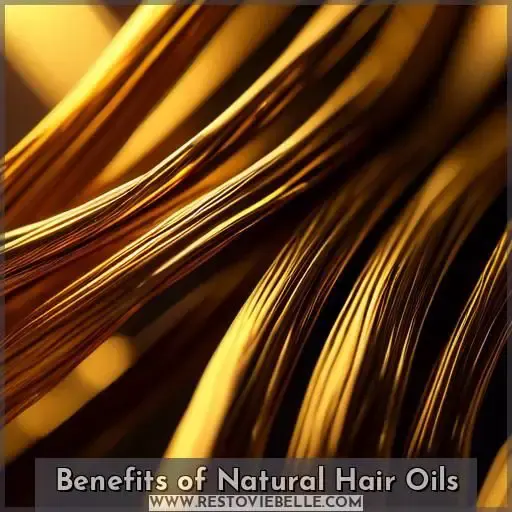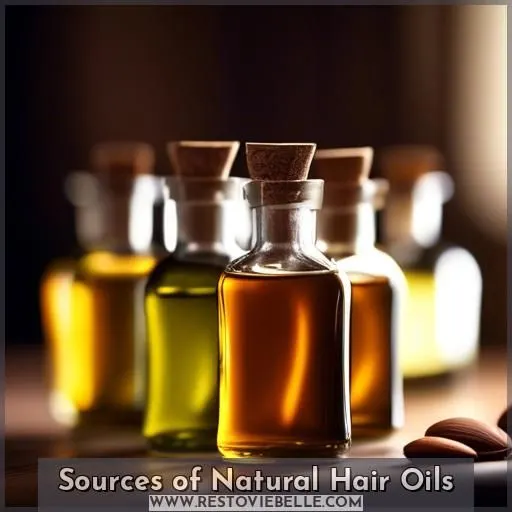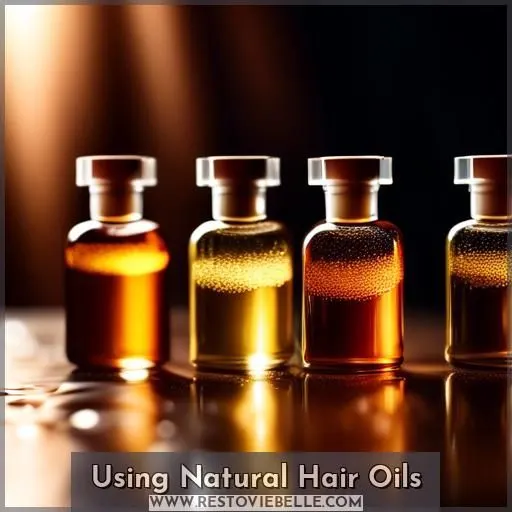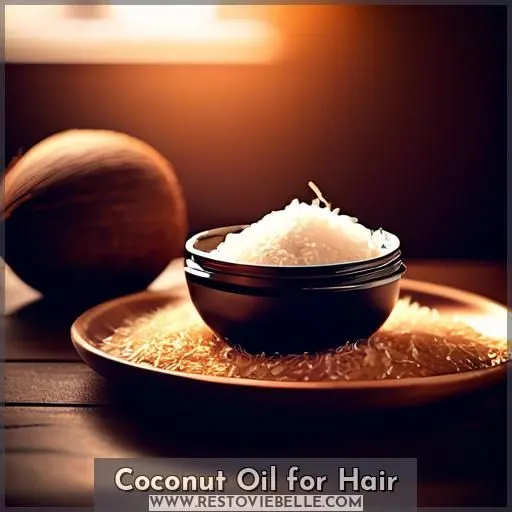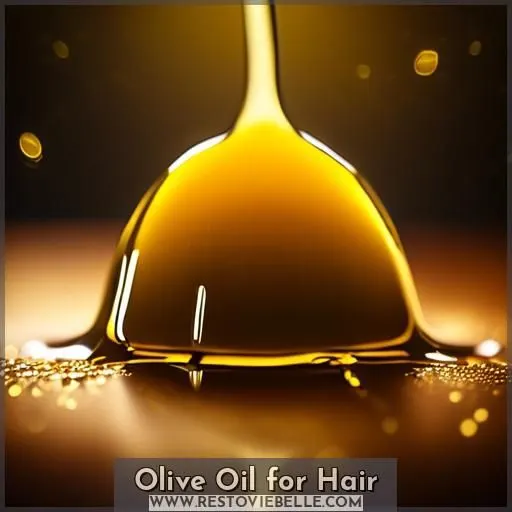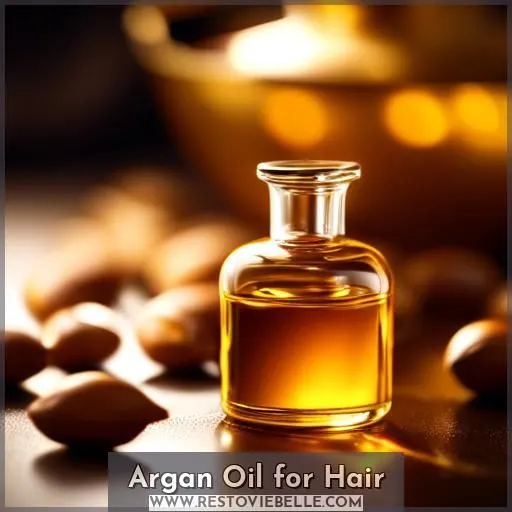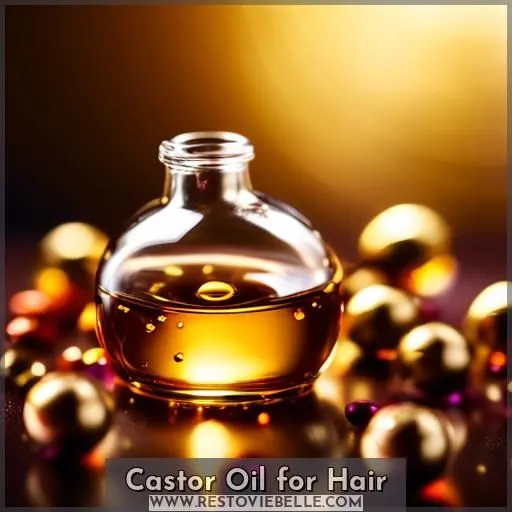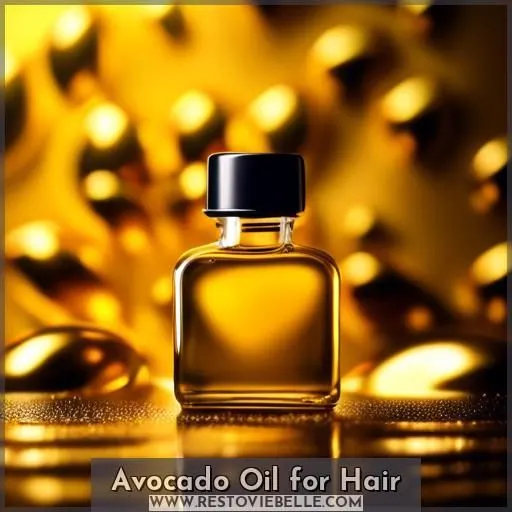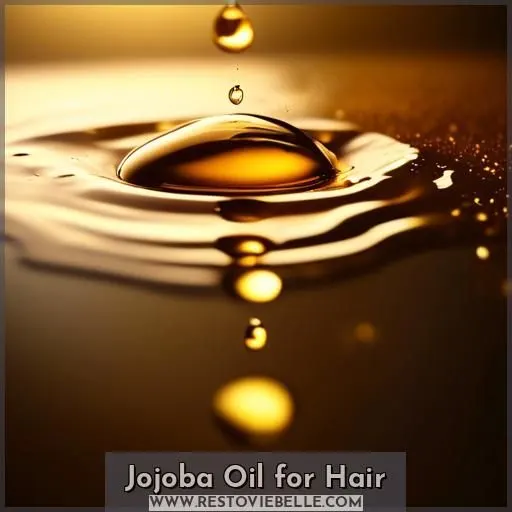This site is supported by our readers. We may earn a commission, at no cost to you, if you purchase through links.
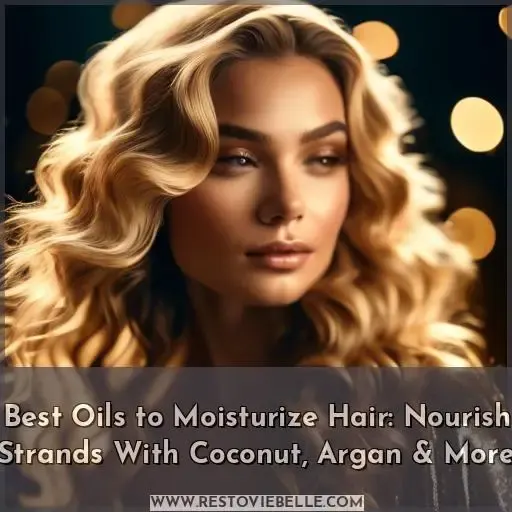 Halt the endless pursuit!
Halt the endless pursuit!
Unleash your hair’s radiant potential with nature’s bounty: the best oils to moisturize hair.
You’ll discover the nourishing powers of coconut, argan, and more, unveiling luscious locks that command attention.
Indulge in this guide to taming frizz, restoring shine, and embracing your hair’s innate beauty – a liberating journey awaits.
Table Of Contents
- Key Takeaways
- Benefits of Natural Hair Oils
- Coconut oil: Repairs damaged hair
- reduces protein loss
- conditions with monounsaturated fats
- and protects from weather-related dryness.
- Argan oil: Treats frizzy
- coarse
- and brittle hair
- protects dye-damaged hair
- Avocado oil: High in fat
- minerals
- and antioxidants
- and is generally considered safe.
- vitamin E
- and protein
- Pre-shampoo treatments: Benefit fine hair.
- dullness
- and damage.
- Sources of Natural Hair Oils
- Using Natural Hair Oils
- Coconut Oil for Hair
- Olive Oil for Hair
- Argan Oil for Hair
- Castor Oil for Hair
- Avocado Oil for Hair
- Jojoba Oil for Hair
- Frequently Asked Questions (FAQs)
- Conclusion
Key Takeaways
- Coconut oil, rich in monounsaturated fats, conditions hair and protects it from dryness caused by weather and dye damage.
- Argan oil’s essential fatty acids nourish hair, leaving it less frizzy and more manageable.
- Olive oil protects hair from weather-related dryness with monounsaturated fats.
- Natural hair oils, such as coconut oil, olive oil, and argan oil, can benefit hair in various ways, including moisturizing, conditioning, protecting from damage, and strengthening hair.
Benefits of Natural Hair Oils
Coconut oil, rich in monounsaturated fats, conditions your hair and protects it from dryness caused by weather and dye damage. Argan oil’s essential fatty acids nourish your hair, leaving it less frizzy and more manageable.
Coconut oil: Repairs damaged hair
Coconut oil is a game-changer when it comes to hair care. It’s not just about adding shine or taming frizz; it’s about repairing damaged hair and boosting its overall health.
- Moisturizes and protects: Coconut oil penetrates the hair shaft, reducing protein loss and protecting your hair from everyday damage. It’s particularly effective for dry, damaged, or color-treated hair, helping to lock in moisture and prevent breakage.
- Reduces dandruff: The oil’s antimicrobial and antifungal properties can help soothe a dry, itchy scalp and reduce dandruff symptoms.
- Enhances hair growth: Some studies suggest that coconut oil may stimulate hair growth by nourishing the scalp and promoting healthy hair follicles.
To get the most out of coconut oil, try these tips:
- Use as a pre-wash treatment: Apply a small amount of oil to your scalp and hair before shampooing to help moisturize and protect your hair.
- As a conditioner: After shampooing, massage a small amount of oil into your hair and leave it on for a few minutes before rinsing.
- Overnight hair mask: For extra-damaged hair, apply a generous amount of oil before bed and wash it out in the morning.
reduces protein loss
Coconut oil’s lauric acid combats protein loss, promoting healthier hair growth.
conditions with monounsaturated fats
Coconut oil conditions hair with monounsaturated fats, providing deep conditioning, scalp protection, and weather protection.
and protects from weather-related dryness.
Olive oil protects hair from weather-related dryness with monounsaturated fats.
Argan oil: Treats frizzy
Argan oil: Treat frizzy hair with this versatile oil, boosting growth and conditioning strands.
coarse
Coarse hair types need suitable oils for hair strengthening, protection, and conditioning.
and brittle hair
If you’re dealing with frizzy, coarse, or brittle hair, you’re not alone. These hair issues can be frustrating and can make it difficult to achieve the smooth, healthy-looking locks you desire. However, there’s good news: natural hair oils can help address these concerns and leave your hair looking and feeling its best.
- Moisturizes your scalp: Dry scalp can lead to dandruff, which isn’t only unsightly but can also be uncomfortable. Natural hair oils, like coconut oil, can help rehydrate your scalp, reducing dandruff and promoting a healthier, more balanced scalp.
- Conditions your hair: Oils like olive oil and argan oil are rich in antioxidants and fatty acids, which can deeply penetrate your hair fibers, conditioning your hair and leaving it looking shinier and fuller.
- Protects your hair from damage: Natural hair oils can help protect your hair from damage caused by styling, heat, and environmental factors. For example, coconut oil has been shown to reduce protein loss, which can help prevent damage and breakage.
- Strengthens your hair: By nourishing your hair and scalp, natural hair oils can help strengthen your hair, making it less prone to breakage and split ends. This can lead to healthier, more manageable hair.
To incorporate natural hair oils into your hair care routine, consider the following tips:
- Add a few drops to your shampoo or conditioner: This can help provide extra moisture and conditioning to your hair.
- Apply to damp hair ends before styling: This can help seal the hair cuticle and prevent split ends.
- Use as a pre-shampoo treatment: Apply a small amount of oil to your scalp and hair, then shampoo as usual. This can help nourish your hair and scalp.
- Try a leave-in treatment: For thick or damaged hair, a leave-in treatment can provide long-lasting moisture and conditioning.
Incorporating natural hair oils into your hair care routine can be a game-changer for those dealing with frizzy, coarse, or brittle hair. By nourishing your hair and scalp, these oils can help you achieve the smooth, healthy-looking locks you desire.
protects dye-damaged hair
Argan oil protects dye-damaged hair by nourishing and providing a protective layer, enhancing the longevity of color-treated hair.
Avocado oil: High in fat
Avocado oil is a fantastic choice for moisturizing and nourishing your hair. It’s packed with omega-3 fatty acids and vitamin E, which work together to provide your hair with the hydration it needs to look and feel its best. You can use avocado oil as a leave-in conditioner or even an overnight treatment, giving your hair a deep nourishing boost.
One of the key benefits of avocado oil is its ability to penetrate deep into the hair shaft, preventing dryness, breakage, split ends, and brittleness. It’s also rich in vitamins A and E, which promote healthy scalp skin.
To use avocado oil in your hair routine, you can apply a few drops directly to your hair or mix it with other oils to create a custom hair mask. Remember to do a patch test first, as some people may have allergies to avocado.
minerals
Minerals play a crucial role in maintaining the health of your hair and scalp. They contribute to the overall strength of your hair, prevent damage, and promote hair growth. Natural hair oils are rich in minerals that can benefit your hair in various ways. For instance, coconut oil is rich in minerals like zinc, copper, magnesium, and manganese, which help close the cuticle tightly, lowering hair to a 2.2 pH level.
Mineral oils, such as petrolatum and paraffin oil, are commonly used in hair care products due to their ability to protect the skin from dehydration and improve texture. These oils are derived from fossil materials like coal, crude oil, or natural gas and are refined to ensure their purity and safety for use in cosmetics.
In addition to mineral oils, other natural hair oils like avocado oil, argan oil, and olive oil also contain essential minerals that can benefit your hair. Avocado oil is rich in potassium, iron, and zinc, which help nourish and strengthen hair. Argan oil contains vitamin E and fatty acids, which are essential for maintaining hair health and preventing damage. Olive oil, on the other hand, is rich in vitamin E and monounsaturated fats, which penetrate hair fibers deeply and condition hair.
When choosing hair oils, it’s essential to consider their mineral content and how they can benefit your hair. Always read the ingredient list to ensure the oil contains the minerals your hair needs for optimal health and growth.
and antioxidants
Antioxidants boost hair growth, repair, strengthen strands, and nourish scalps.
and is generally considered safe.
Natural hair oils are safe and beneficial for hair care. They offer pre-shampoo treatments, hair mask ingredients, and nourishing oils to address scalp irritation and enhance hair texture.
vitamin E
If you’re seeking to revitalize your hair with the power of vitamin E, you’re in luck! This essential nutrient is known for its antioxidant properties, which can help combat the damaging effects of free radicals on your hair and scalp.
- Scalp Health: Vitamin E supports a healthy scalp by regulating oil production, balancing pH levels, and preventing free radicals from breaking down the cells on your scalp.
- Hair Growth: By increasing circulation and blood flow to the scalp, vitamin E may aid in hair growth.
- Shine: Vitamin E helps replace the protective fat layer on the outside of your hair cuticle, which can prevent dull and frizzy hair.
To harness the benefits of vitamin E for your hair, you have several options:
- Hair Products: Look for hair care products that contain vitamin E, such as leave-in conditioners, serums, or shampoos.
- Diet: Incorporate vitamin E-rich foods into your diet, such as nuts, seeds, and oils.
- Hair Masks: Mix vitamin E oil with a carrier oil, like coconut oil, and apply it to your scalp to stimulate blood flow and hair growth.
- Oral Supplements: Consult your doctor before taking vitamin E supplements, as they may interact with certain medications and have potential side effects.
and protein
Nourish your hair with natural oils that strengthen, protect, and promote growth. Coconut oil repairs damaged hair and reduces protein loss, while argan oil treats frizzy, coarse hair and protects from dye damage.
Avocado oil is high in fat, minerals, and antioxidants, and is generally considered safe. Pre-shampoo treatments benefit fine hair, and leave-in treatments suit thick or damaged hair.
Pre-shampoo treatments: Benefit fine hair.
Pre-shampoo treatments for fine hair? Yes, please!
These treatments are designed to enhance your hair’s health and appearance.
They can help nourish your fine hair, addressing the specific needs of thin strands.
By using pre-shampoo treatments, you’re not only seeking more than just a quick fix.
You’re unlocking the secrets to a healthier, fuller head of hair.
It’s not merely an oil or a treatment; it’s a bespoke, tailored approach toward addressing the complexities of fine hair.
dullness
Moisturize to banish dullness, hydrate roots, and unleash radiant shine.
and damage.
When it comes to addressing dryness, dullness, and damage in your hair, natural oils are your best friend. These oils can strengthen your hair, enhance its texture, and even eliminate dandruff by moisturizing your scalp.
- Coconut Oil: This oil is rich in lauric acid, which repairs damaged hair and reduces protein loss. It also conditions your hair with monounsaturated fats and protects it from weather-related dryness. Coconut oil is suitable for all hair types and is widely favored for its moisturizing properties.
- Olive Oil: Olive oil penetrates hair fibers deeply, conditions your hair with monounsaturated fats, and protects it from weather-related dryness. It also smoothes curls and should be used sparingly to avoid an oily appearance.
- Argan Oil: Argan oil is packed with essential fatty acids and treats frizzy, coarse, and brittle hair. It also protects dye-damaged hair and helps prevent damage from oxidative dyes.
- Avocado Oil: High in fat, minerals, and antioxidants, avocado oil can be used in a hair mask or as a hot oil treatment. It leaves on for up to 3 hours and is generally considered safe, but always do a patch test if you’ve never eaten avocado.
- Jojoba Oil: Jojoba oil mimics sebum, adds shine, reduces frizz, seals moisture, and strengthens hair.
These oils can be used in various ways, such as adding a few drops to your shampoo or conditioner, applying to damp hair ends before styling, or using as a pre-shampoo treatment. They can also be used as leave-in treatments for thick or damaged hair or as pre-shampoo treatments for fine hair.
Sources of Natural Hair Oils
Natural hair oils are extracted from a variety of plant-based sources, including nuts, seeds, and fruits. These oils are rich in essential fatty acids, vitamins, and minerals that can help strengthen, moisturize, and protect your hair.
- Coconut Oil: Derived from the dried kernels of coconuts, this oil is rich in fatty acids that penetrate the hair shaft, preventing protein loss and promoting hair strength. It’s suitable for all hair types, particularly those with dry, damaged, or dull hair.
- Olive Oil: Extracted from the fruit of the olive tree, this oil is high in vitamin E and monounsaturated fats that condition hair and protect it from weather-related dryness. It’s ideal for those with dry or damaged hair.
- Avocado Oil: Derived from the fruit of the avocado tree, this oil is rich in fat, minerals, and antioxidants that can deeply nourish and repair damaged hair. It’s generally considered safe, but it’s advisable to do a patch test if you’ve never eaten avocado.
- Argan Oil: Extracted from the kernels of the Moroccan argan tree, this oil is rich in vitamin E and antioxidants that nourish and hydrate the hair, reducing frizz and split ends. It’s suitable for all hair types, particularly those with frizzy, coarse, or brittle hair.
- Jojoba Oil: Derived from the seeds of the jojoba plant, this oil closely mimics the natural oils produced by the scalp, moisturizing hair without leaving a greasy residue. It’s ideal for individuals with oily hair.
- Almond Oil: Extracted from almonds, this oil is rich in omega-9 fatty acids, vitamin E, and protein that can nourish and strengthen hair. However, it isn’t suitable for those allergic to tree nuts.
- Castor Oil: Derived from the seeds of the castor oil plant, this oil is rich in fatty acids and antioxidants that stimulate hair growth and improve scalp health. It’s particularly beneficial for those with thinning hair or dandruff.
When choosing natural hair oils, consider their extraction methods, ethical sourcing, and sustainable practices. Hair oil blends and natural oil alternatives can be a great way to incorporate these beneficial oils into your hair care routine.
Using Natural Hair Oils
Using natural hair oils is a fantastic way to nourish and protect your hair. Here’s a step-by-step guide on how to incorporate these oils into your hair care routine:
- Carrier Oils: These are derived from plants like nuts, seeds, and fruits. They’re used to dilute essential oils and make them safe for topical use. Some popular carrier oils for hair care include coconut oil, jojoba oil, argan oil, and olive oil.
- Essential Oils: These are volatile compounds extracted from plants. They can be added to carrier oils to enhance their benefits. Some popular essential oils for hair care include peppermint oil, lavender oil, and tea tree oil.
- Leave-in Treatments: Apply a few drops of your chosen oil to damp hair ends before styling. This will help to seal in moisture and protect your hair from damage.
- Pre-shampoo Treatments: Warm a small amount of oil in your hands and massage it into your scalp for 30 minutes before shampooing. This is particularly beneficial for fine hair, as it can help to add volume and body.
- Scalp Massages: Use a carrier oil like jojoba oil or argan oil to massage your scalp. This can help to reduce scalp irritation and promote hair growth.
- Hot Oil Treatments: Apply a warm oil treatment to your hair and leave it on for a few hours. This is a great option for thick or damaged hair, as it can help to deeply condition and repair your hair.
- Sun Protection: If you’re spending time in the sun, consider using a carrier oil with a high UV protection factor, like coconut oil, to protect your hair from sun damage.
Coconut Oil for Hair
Coconut oil is a popular choice for nourishing dry hair and scalp. It contains lauric acid, which repairs damaged hair and reduces protein loss, making it a great conditioner for all hair types.
- As a leave-in conditioner: Apply a small amount to your hair and massage it in, focusing on the ends.
- Overnight treatment: Apply coconut oil to your hair before bed and let it sit overnight for a deep conditioning treatment.
- Scalp massage: Apply coconut oil to your scalp and massage it in to soothe and moisturize the skin.
- Hot oil treatment: Heat the coconut oil slightly and apply it to your hair, leaving it on for 30 minutes before shampooing.
- Pre-shampoo treatment: Apply coconut oil to your hair before shampooing, especially for fine hair.
When selecting a coconut oil, choose one that has been cold-pressed or certified organic to ensure the least amount of processing and maximum nutrient retention. Remember to do a patch test before applying coconut oil to your scalp to ensure you don’t have any adverse reactions.
Olive Oil for Hair
Olive oil is a versatile ingredient in hair care, known for its deep conditioning properties.
This monounsaturated fat-rich oil penetrates hair fibers deeply, providing a nourishing treatment for your strands. It conditions hair with its fatty acids, protecting it from weather-related dryness.
To use olive oil for hair, you can apply a few drops to damp hair ends before styling, or leave it on for up to 15 minutes as a pre-shampoo treatment. It’s suitable for all hair types and can even help smooth curls when scrunched into damp hair.
Remember to use olive oil sparingly to avoid an oily appearance.
It’s not just about deep conditioning; olive oil also contributes to hair growth by reducing protein loss from your hair.
Incorporate olive oil into your hair care routine for a healthier, more radiant look.
Argan Oil for Hair
Argan oil is a treasure trove of benefits for your hair. This natural oil, derived from the kernels of argan trees in Morocco, is packed with vitamin E, fatty acids, and antioxidants that work together to nourish and protect your strands.
- Strengthens hair: Argan oil helps to strengthen hair by restoring its elasticity, thereby reducing breakage.
- Moisturizes dry hair: It serves as a potent moisturizer, hydrating dry and damaged hair, and preventing frizz.
- Boosts shine: Argan oil imparts a radiant shine to the hair, contributing to an overall healthy appearance.
Argan oil is suitable for all hair types, including fine and straight hair. However, those with thick, curly, or color-treated hair can benefit from its rich nutrients. It’s also a great option for those with a history of seborrheic dermatitis or dandruff, as it can be used in shampoos and conditioners without triggering flare-ups.
To use argan oil, you can apply it directly to wet or dry hair, or use argan oil-infused hair products like shampoos, conditioners, masks, and styling aids. For best results, apply it after washing your hair while it’s still wet, or use it as a heat protectant before blow-drying or styling. Remember, a little goes a long way – you only need a few drops to get the desired effect.
Castor Oil for Hair
Castor oil is a natural remedy that has been used for centuries to promote hair growth and improve hair health. It contains ricinoleic acid, an emollient that creates a barrier between your hair and the outside world, helping to retain moisture in your scalp and prevent dandruff. Castor oil can also reduce inflammation on the scalp, which may help alleviate irritation and promote hair growth. While there’s limited scientific evidence to support its hair growth claims, many people find that castor oil helps to improve the condition of their hair and scalp.
To use castor oil for hair growth, you can apply a few drops to your scalp and massage it in, or use it as a hair mask by applying it to dry hair and leaving it on for a few hours before washing it out. It’s recommended to use castor oil no more than once a week to avoid over-oiling and greasiness. If you have dandruff, applying castor oil to the roots of your hair can help protect your scalp and keep it from flaking off.
Castor oil is also known for its antifungal properties, which can help reduce dandruff caused by an overgrowth of the fungus Malassezia. It may also help to thicken hair strands, making them more resistant to breakage.
In summary, castor oil is a natural remedy that can help improve hair health, reduce dandruff, and potentially promote hair growth. It’s safe for most hair types and can be used in various ways, such as a scalp treatment or a hair mask.
Avocado Oil for Hair
Avocado oil is another natural oil that can be used to moisturize and protect your hair.
- High in fat, minerals, and antioxidants: Avocado oil is rich in fatty acids, vitamins, and minerals, making it a great choice for nourishing your hair.
- Versatile usage: You can use avocado oil in a hair mask or as a hot oil treatment. For a hair mask, mix avocado oil with other ingredients like honey or egg yolk, apply it to your hair, and leave it on for a few hours before rinsing. For a hot oil treatment, heat the oil slightly and massage it into your scalp and hair for 30 minutes before shampooing.
- Safe and effective: Avocado oil is generally considered safe for use on hair. However, it’s always advisable to do a patch test before using it on your scalp, especially if you’ve never eaten avocado.
- Promotes hair growth: Avocado oil isn’t only designed to enhance the appearance of your hair but also contributes to its overall health. By stimulating blood flow to the scalp, it can help promote hair growth and prevent hair loss.
Jojoba Oil for Hair
Jojoba oil is a must-have in your hair care routine if you’re looking for a natural ingredient that can improve the health of your hair. Derived from the seeds of the jojoba plant, this oil is rich in vitamins and minerals that nourish your hair over time. It’s also known for its moisturizing properties, which can help prevent dryness that leads to hair loss.
To use jojoba oil, you can apply it directly to your hair or add it to your conditioner. It’s a great option for those with fine hair, as it can enhance the conditioning process, leaving your locks with better strength, shine, and manageability. If you’re dealing with dandruff, jojoba oil can also help soothe your scalp and maintain its natural balance.
Jojoba oil isn’t only beneficial for its moisturizing properties but also for its potential to promote hair growth. It contains vitamins B, E, and C, as well as minerals like copper and zinc, which nourish your hair and make it stronger and thicker. While it’s not yet known to stimulate hair growth or prevent hair loss, it can certainly be a valuable addition to your hair care routine for its other benefits.
To get the most out of jojoba oil, you can use it as a pre-shampoo treatment or a post-shampoo leave-in scalp conditioner to combat dandruff. You can also use it as a hair mask or hot oil treatment to deeply condition your hair and repair damage caused by heat styling tools or chemical treatments.
Incorporating jojoba oil into your hair care routine can be a simple yet effective way to improve the health and appearance of your hair. With its moisturizing, nourishing, and potential growth-promoting properties, it’s a versatile ingredient that’s worth exploring for those seeking to enhance their hair’s overall health.
Frequently Asked Questions (FAQs)
What are the best natural hair oils for dry hair?
Coconut, olive, and argan oils hydrate dry hair like a tall glass of water on a scorching day. They penetrate strands, seal in moisture, and leave your locks soft, shiny, and quenched.
How often should I use hair oil for optimal results?
You’ll want to use hair oil 2-3 times a week for maximum nourishment. Too often and your hair may look greasy; too little and you’ll miss out on those luscious locks! Finding that sweet spot takes some experimentation, but your tresses will thank you.
What is the best way to apply hair oil for maximum benefits?
For maximum benefits, apply a few drops of hair oil to damp, clean hair from mid-length to ends. Gently massage it in, letting it absorb before styling. An overnight hot oil treatment every week or two deeply nourishes strands.
Can I use essential oils in my hair oil mixture?
Nearly 70% of hair oils contain essential oils. But you shouldn’t use them directly – they’re potent and can irritate your scalp. Instead, dilute a few drops in a carrier oil like coconut or jojoba for safe, fragrant nourishment.
How long should I leave hair oil in before rinsing?
Leave hair oil treatments in for 15-30 minutes for best absorption. Longer processing time – up to overnight – delivers deeper conditioning and repair for severely dry, damaged strands.
Conclusion
Embrace nature’s opulent gifts: the best oils to moisturize hair await. From coconut’s reparative caress to argan’s frizz-taming powers, these elixirs breathe life into lackluster strands. Unveil your hair’s radiant potential by indulging in these nourishing treatments, unveiling luscious locks that captivate admirers.
